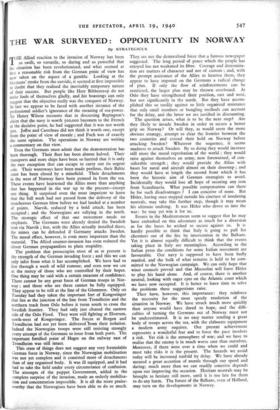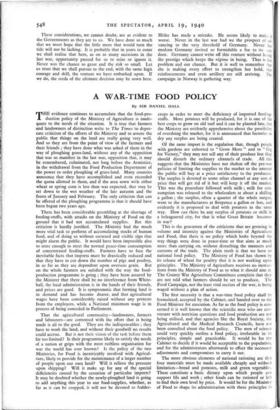THE WAR SURVEYED : OPPORTUNITY IN NORWAY
By STRATEGICUS
THE Allied reaction to the invasion of Norway has been so swift, so versatile, so daring and so powerful that the situation has been revolutionised, and what seemed at first a reasonable risk from the German point of view has now taken on the aspect of a gamble. Looking at the Germans' stroke from the outside, it seemed at first impossible to doubt that they realised the inevitably temporary nature of their success. But people like Herr Ribbentrop do not make fools of themselves gladly, and his boastings can only suggest that the objective really was the conquest of Norway. In fact we appear to be faced with another instance of the professional soldier's ignorance of the meaning of sea-power. Sir Henry Wilson recounts that in discussing Repington's claim that the navy is worth 500,000 bayonets to the French at the decisive point, he had suggested that it was not worth 500. Joffre and Castelnau did not think it worth one, except from the point -of view of morale ; and Foch was of exactly the same opinion. The operations in Norway are writing a commentary on that view.
Even the Germans must admit that the demonstration has been thorough. Their fleet has been almost halved. Their transports and store ships have been so harried that it is only the rare exception that can escape to carry out its urgent tole. Their waterways have been made perilous, their Baltic coast has been closed by a minefield. Their detachments in the west of Norway have been penned in. from the sea. These events have heartened the Allies more than anything that has happened in the war up to the present—except one thing. It surprised even the most impatient to learn that the full week had not passed from the delivery of the treacherous German blow before we had landed at a number of points. Narvik, reduced by a bold attack, has been occupied ; and the Norwegians are rallying in the north. The strategic effect of that one movement needs no emphasis. The Germans were already denied the Swedish iron via Narvik ; but, with the Allies actually installed there, the mines can be defended if Germany attacks Sweden. The moral effect, however, is even more important than the material. The Allied counter-invasion has even reduced the clever German propagandists to plain stupidity.
The problem that preoccupies most of us at present is the strength of the German invading force ; and this we can only infer from what it has accomplished. We have had to live through a week of wild rumour, and even now we :ire at the mercy of those who are controlled by their hopes. One thing may be said with a certain measure of confidence. There cannot be any great force of German troops in Nor- way ; and those who are there cannot be fully equipped. They appear to be still at the line of the Glommen. Only on Tuesday had they taken the important fort of Kongsvinger that lies at the junction of the line from Trondheim and the northern track from Oslo before it turns south to cross the Swedish frontier. They had only just cleared the eastern side of the Oslo Fjord. They were still fighting at Elverum, north-west of Kongsvinger. The forces at Bergen and Trondheim had not yet been delivered from their isolation. Indeed the Norwegian troops were still resisting strongly every attempt of the Germans to issue from both ports. The important fortified point of Hegre on the railway east of Trondheim was still intact.
This state of things does not suggest any very formidable German force in Norway, since the Norwegian mobilisation was not yet complete and it consisted more of detachments than of any organised body. It was ill equipped, and it had had to take the field under every circumstance of confusion. The attempts of the puppet Government, added to the complete surprise of the invasion, made an orderly mobilisa- tion and concentration impossible. It is all the more praise- worthy that the Norwegians have been able to do so much. They are not the demoralised force that a famous newspaper suggested. The long period of peace which the people has enjoyed has not weakened its fibre. Courage and determina- tion are matters of character and not of custom ; and, with the prompt assistance of the Allies to hearten them, they appear to have imposed on the Germans a radical change of plan. If only the flow of reinforcements can be restricted, the larger plan may be thrown overboard. At Oslo they have strengthened their position, east and west, but not significantly in the north. But they have accom- plished this so tardily against so little organised resistance that only small numbers or bungling methods can account for the delay, and the latter we are justified in discounting.
The question arises, what is to be the next step? Are they likely to invade Sweden in order to secure a better grip on Norway? Or will they, as would seem the more obvious strategy, attempt to clear the frontier between the two countries and extend their hold on Norway before attacking Sweden? Whatever the sequence, it seems madness to attack Sweden. By so doing they would increase still more the moral reprobation of the world ; they would raise against themselves an army, now forewarned, of con- siderable strength ; they would provide the Allies with bases for naval and aircraft almost on their doorstep ; and they would have at length the second front which it has been the historic aim of German strategists to avoid. Incidentally they would lose all hope of securing any iron from Scandinavia. What possible compensation can there be for such disadvantages ? I can conceive of none. But Hitler, having once stepped outside his cincture of insulating neutrals, may take this further step, though it may mean his ultimate undoing. It was Hitler who drove us into the war: he may yet win it for us.
Events in the Mediterranean seem to suggest that he may have embarked on this adventure as much for a diversion as for the bases he wished to secure against us. It is hardly possible to think that Italy is going to pull his chestnuts out of the fire by intervention in the Balkans. Yet it is almost equally difficult to think that the events taking place in Italy are meaningless. According to the Italian press the conditions for some Italian movement are favourable. Our navy is supposed to have been badly mauled, and the bulk of what remains is held to be com- mitted to the Norwegian campaign. We can only hope that wiser counsels prevail and that Mussolini will leave Hitler to play his hand alone. And, of course, there is another neutral, looking with eager eyes on the Atlantic coast which we have now occupied. It is better to leave time to solve the problems these suggestions raise.
They have, however, this importance: they reinforce the necessity for the most speedy resolution of the situation in Norway. We have struck much more quickly than anyone would have dared to hope, and the diffi- culties of turning the Germans out of Norway must not be underestimated. It is no easy matter sending a great body of troops across the sea, with the elaborate equipment a modern army requires. Our present achievement represents a wonderful feat and to force the pace involves a risk. Yet risk is the atmosphere of war; and we have to realise that the enemy is in much worse case than ourselves. Moreover, if there were ever a time when we could and must take risks it is the present. The hazards we avoid today will be increased tenfold by delay. We have already secured a great accretion of morale through our speed and daring; much more than we can readily conceive depends upon our improving the occasion. Hesitant neutrals may be brought to hesitate still more, until it is too late for them to do any harm. The future of the Balkans, even of Holland, may turn on the developments in Norway. These considerations, we cannot doubt, are as evident to the Governments as they are to us. We have done so much that we must hope that the little more that would turn the tide will not be lacking. It is probable that in years to come we shall realise that here, as on so many occasions in the last war, opportunity paused for us to seize or ignore it. Never was the chance so great and the risk so small. Let us trust that we shall pursue to the end, with the same high courage and skill, the venture we have embarked upon. If we do, the seeds of the ultimate decision may be sown here. Hitler has made a mistake. He seems likely to make it worse. Never in the last war had we the prospect of ad- vancing to the very threshold of Germany. Never has modern Germany invited so formidable a foe to its very door. Germany cannot write off this venture without losing the prestige which keeps the regime in being. That is her problem and our chance. But it is well to remember that she is making every effort to strengthen her hold, that reinforcements and even artillery are still arriving. The campaign in Norway is gathering way.











































 Previous page
Previous page